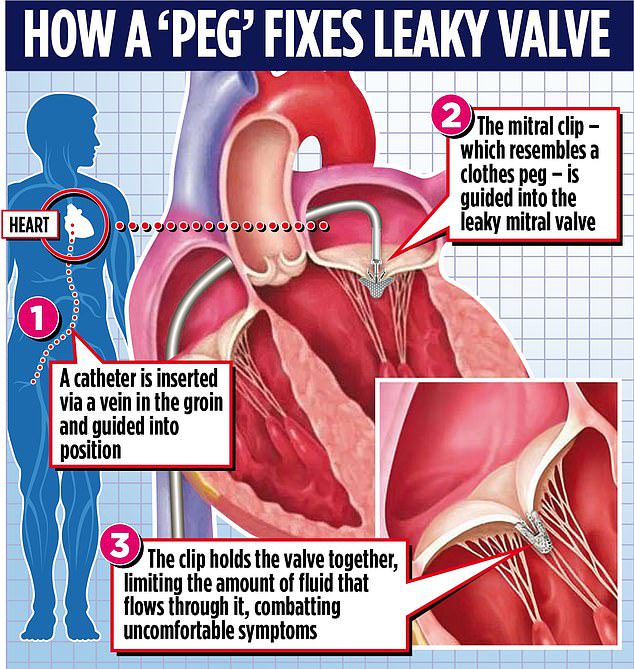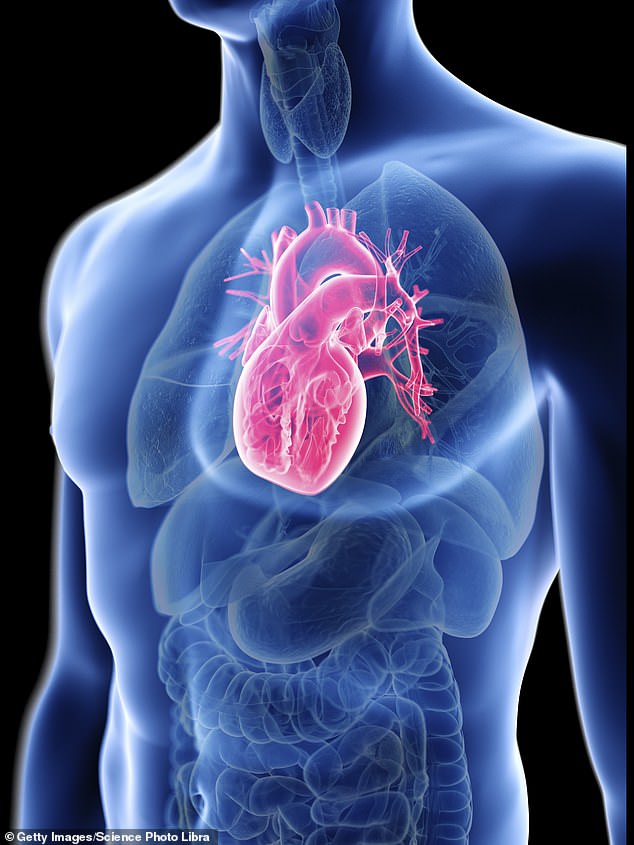Hundreds of sufferers affected by a standard coronary heart drawback who turns into weak and struggles to breathe are being denied fast operations that might rework their lives and cut back their threat of demise.
A probably deadly situation known as mitral regurgitation (MR), affecting round one in 50 individuals, is brought on by a leaky coronary heart valve – and might depart victims exhausted even with day by day actions similar to bathing or getting dressed.
Open coronary heart surgical procedure may remedy the issue, however is usually seen as too dangerous. However now surgeons have developed a keyhole process which they consider may deal with hundreds extra MR sufferers – however they are saying they’re being blocked by the NHS.
This landmark operation, known as transcatheter edge-to-edge restore (TEER), includes inserting a skinny tube known as a catheter right into a vein within the affected person's groin, which carries a small clip, the scale of a clothespin, to the guts.
Clipping the defective valve can cut back the leak and restore regular coronary heart operate, dramatically bettering high quality of life, even for critically sick sufferers. The process takes two hours, has a brief restoration time and, as a result of it’s much less invasive, has fewer problems.

This extraordinary operation, known as transcatheter edge-to-edge restore (TEER), includes inserting a skinny tube known as a catheter right into a vein within the affected person's groin, which carries a small clip, the scale of a clothespin, to the guts.

A probably deadly situation known as mitral regurgitation (MR), affecting round one in 50 individuals, is brought on by a leaky coronary heart valve – and might depart victims exhausted even with day-to-day actions similar to bathing or getting dressed (inventory picture)
However at a value of round £30,000 per affected person, which is nearly twice the price of open coronary heart surgical procedure, the NHS has solely authorised the comparatively new process for a restricted class of sufferers. So campaigners are urging the principles to be modified to make it extra extensively out there.
Dr Jonathan Byrne, a heart specialist at King's School London and UK head of the Valve for Life group, warned that too many sufferers are left struggling. The Valve for Life group goals to develop entry to keyhole remedy for individuals with coronary heart valve illness.
He stated: 'Numerous sufferers are disadvantaged of this routine, secure and efficient therapy. They proceed to undergo debilitating signs. They might want to go to their GPs ceaselessly. Many are out and in of A&E. Some even die.
'That is very irritating, as a result of TEER is definitely very easy, even for a affected person who could be very unwell.'
For 44-year-old Nikolay Olifirenko, TEER gave him again his life after a coronary heart assault. He was rushed to hospital in the course of the night time, the place he was identified with extreme coronary heart failure and a leaky mitral valve.
In contrast to a coronary heart assault, which is brought on by a blockage in blood circulation, coronary heart failure is a lethal long-term situation during which the muscle doesn't pump in addition to it ought to, so not sufficient oxygenated blood will get all through the physique, leading to debilitating signs.
With respiratory difficulties, Mr Olifirenko was bedridden and so weak he was unable to wash or change his pyjamas with out help. After a month in intensive care, he was warned he may want a coronary heart transplant.
Though he was not technically eligible for TEER, the NHS determined to make the process out there to him as an exception because of the severity of his situation.
Final month, Dr Byrne carried out the process – after which Mr Olifirenko was capable of return dwelling and lead a standard life.
Ukrainian Mr Olifirenko, who lives in London, stated: 'The day I had the guts assault I awoke at 1am with extreme ache in my chest and left arm. I couldn't breathe correctly. My blood strain was very excessive and my physique was swollen – my legs, arms, face.
'I wanted 24-hour monitoring and couldn't even stroll.

However at a value of round £30,000 per affected person, which is round twice the price of open coronary heart surgical procedure, the NHS has solely authorised the comparatively new process for a restricted class of sufferers (inventory picture)
'My coronary heart valve leaked badly and I went into extreme coronary heart failure. I used to be in intensive take care of a few month.
'I used to be so sick the workforce have been contemplating an instantaneous coronary heart transplant. I used to be terrified – I by no means thought I'd get out of hospital.
'Fortunately my physician supplied a keyhole mitral TER process and I made a full restoration.'
The mitral valve is a small flap within the coronary heart that makes positive blood solely flows in a single route. Mitral regurgitation happens when the valve fails to shut correctly, so blood flows within the fallacious route.
MR impacts about two % of the inhabitants, though most are handled with medicines, not surgical procedure. The situation is extra widespread in older individuals. One sort – degenerative MR (DMR) – happens when put on and tear on the valve causes it to leak. The opposite, known as purposeful MR (FMR), happens when the valve doesn't work due to one other situation or drawback, similar to a coronary heart assault or stroke.

MR impacts about two % of the inhabitants, though most are handled with medicines, not surgical procedure. The situation is extra widespread in older individuals (inventory photograph)
Till just lately, extreme MR may solely be handled by repairing or changing the mitral valve by way of open coronary heart surgical procedure. Nonetheless, such main surgical procedure is just too dangerous for some sufferers. Surgeons additionally discovered that though open coronary heart surgical procedure is sweet for treating sufferers with DMR, it’s much less efficient and extra dangerous for sufferers with FMR.
In distinction, TEER works for sufferers with the MR variant, and may also be used the place open coronary heart surgical procedure wouldn’t be appropriate. However in 2019, the NHS introduced that TEER may solely be used for sufferers with DMR – round 500 per yr.
Docs consider this drug is also given to three,000 or extra FMR sufferers per yr.
Professor Dan Blackman, chairman of the British Cardiovascular Interventional Society Structural Coronary heart Group, additionally believes it needs to be made extra extensively out there. He stated: 'TEER is the usual in different nations, however our price is the bottom in Europe. I hope the NHS will rethink it.'
Final week NHS England stated it might rethink using TEER for sufferers with FMR.
The spokesperson stated: 'NHS England is dedicated to offering secure and efficient therapies in a good and equitable approach for sufferers of all scientific traits.'


